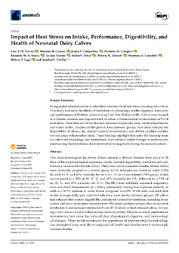Impact of heat stress on intake, performance, digestibility, and health of neonatal dairy calves.
Impact of heat stress on intake, performance, digestibility, and health of neonatal dairy calves.
Autoria: NEVES, L. F. M.; GOMES, M. B.; CAMPOLINA, J. P.; CAMPOS, M. M.; SOUZA, E. M. B.; DIAVÃO, J.; SILVA, A. S.; TOMICH, T. R.; CARVALHO, W. A.; LAGE, H. F.; COELHO, S. G.
Resumo: This study investigates the effects of heat stress in a climate chamber from day 0 to 28 days of life on physiological responses, intake, nutrient digestibility, immunity, and performance in neonatal Holstein calves. Thirty-four calves (nineteen females, fifteen males) were randomly assigned to a control group (CON, temperature–humidity index [THI] 66, with 22 ?C and 65% humidity for 24 h, n = 17) or a heat-stressed (HS) group, which was exposed to a THI of 82, 32 ?C, and 65% humidity for 9 h, followed by a THI of 66, 22 ?C, and 65% humidity for 15 h. The HS calves exhibited increased respiratory rates and rectal temperatures (p < 0.001), particularly during heat exposure periods, as well as a 59.5% increase in water intake compared to CON. While milk and solid feed intake, average daily gain, and feed efficiency were similar between groups, HS calves had reduced ether extract digestibility and altered ruminal fermentation, including lower acetate and lower propionate concentrations. The blood cytokine analysis showed elevated interleukin-4 and reduced interleukin-8 and IP-10 levels in heat-stressed calves, indicating a shift toward an anti-inflammatory immune profile. Despite no major performance impairments, heat stress has induced clear physiological, digestive, and immunological changes. These results underscore the importance of implementing thermal mitigation strategies during early life to safeguard calf health and development in increasingly warmer climates.
Ano de publicação: 2025
Tipo de publicação: Artigo de periódico
Unidade: Embrapa Gado de Leite
Palavras-chave: Bezerro Leiteiro, Bovino, Dairy calves, Desmama, Gado Leiteiro, Temperature
Observações
1 - Por padrão são exibidas publicações dos últimos 20 anos. Para encontrar publicações mais antigas, configure o filtro ano de publicação, colocando o ano a partir do qual você deseja encontrar publicações. O filtro está na coluna da esquerda na busca acima.
2 - Para ler algumas publicações da Embrapa (apenas as que estão em formato ePub), é necessário ter, no celular ou computador, um desses softwares gratuitos. Sistemas Android: Google Play Livros; IOS: iBooks; Windows e Linux: software Calibre.
Acesse outras publicações
Acesse a Base de Dados da Pesquisa Agropecuária (BDPA) para consultar o acervo completo das bibliotecas da Embrapa.

